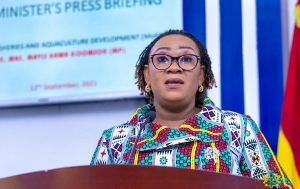On waking up in the year 2005 to know that my beloved country has adopted information and communication technologies to help alleviate our poverty-stricken processes and services; I became a happy man. I said to myself meritocracy is once again been given a chance to function in the land where most citizens and the inhabitants have come to believe that to survive and prosper depends on ‘connection’, patronage, nepotism, associations and political party loyalty.
Most of my acquaintances did not share in my hope and enthusiasm but described the intervention as the proverbial nine day wonder policies and initiatives that have characterized our beloved country when it comes to the implementation of lofty and workable ideas. Examples are given as consolidated pay scheme for public servants; backyard garden concept for operation feed yourself; GV registration of all government vehicles. I have an interesting story of a revolutionist who refused to use a brand new Nissan vehicle because he wanted a change to the general public numbering system.; Vice President’s campaign on indiscipline; AMA Mayor’s 100 days in office pledge; demolition of structures in flood prone areas of the Accra metropolis, specifically in the Ga East and many more in the past 40 years.Maybe the object this article is addressing has not yet joined the above examples, but only a thorough explanation by GES with its attended demystification can elude many parents/guardians possible misconceptions or answer their fears including mine. I am referring to the computerization of the SHS student selection. Once upon the time, the headmaster or mistress from Axim to Aflao to Bimbilla and Zebrugugu travelled to a chosen location for the annual ritual of selecting students for their institutions. Before and immediately after these exercises was a worry for most decent headmasters/mistresses but a goldmine for unscrupulous heads and their cohorts. Therefore, it was a welcome relief for most heads of institutions, parents, educational authorities and forward thinking Ghanaians. There were a few, such as old student associations, political and traditional authorities under the banner of protocol, some staff of GES, MOES and teachers of SHS who wards were approaching SHS stage who had issues for various reasons. This piece is not meant to diagnose these concerns. It would be handled when the opportunity arises.
Ghana’s flagship ICT centre, Ghana-India Kofi Annan Centre of Excellence in ICT, aka AITI pronounced ‘IT’ in collaboration with GES held a seminar to discuss the pros and cons and the inner workings of the GES Student Placement software. This was done to allay the fears and misconception that had been bundled with the release or the first output of the system. The software developers and GES explained the functions of the systems. Here are a few salient points that were clarified: Available spaces for students are provided by heads of institutions Numerical value used for placing student is by the raw score for each subject and not the scaler descriptor such as ‘1’ or ‘3’. Those of you who remember common entrance scores – 299, 306 etc Placements were also based on subjects/areas offered by the institution of choice. As goes for all computer systems the ‘GIGO’ concept was explained. Garbage In Garbage Out. This calls for careful filling by students with supervision preferable by parents or guardians. For example, if a male student mistakenly shades the gender female slot, these are the possible results:
a. If he fails to make the grade for his first 3 choices, then the computer can allocate female only school.
b. If his first 3 choices are boys only school the system may not allocate because of the gender choice made The system also required candidates to fill out the district of choice. This came into play when you fail to make the grade for your choice schools and the computer would placed you in any school available in district. Some failed to fill out this portion and that accounted for the system allocating available slot which sometimes ended students being placed in far away schools from their abode. There were still some doubters and the old boyism chaps who would have nothing of this, but overall most present were satisfied just I was from the beginning and that for once Ghana is giving all Ghanaians a fair chance although some might consider the circumstances and processes most rural and urban poor traveled to sit the exams used as input for the placement system cannot be describe as fair. But still it was refreshing to see a worthwhile, although not cheap but later a better cost saving mode of managing a costly and burdensome venture.
Last year, my niece did very well compared to myself, but not as one of her parents would have wished. Although her parents exercise some fear, I said to them ‘computer no lie’, therefore it was a fruitless venture to try and visit any headmaster or headmistress or men of influence as being advised. And I won the day when ‘my computer’ placed her in the school of her first choice and a very good school in Cape Coast. So this year when some friends sought my advice on going to see a headmistress, ‘men of influence’, ‘computerman’ (placement room staff) and others’.
I allayed their fears and preached the virtues computer behaviour and the “new Ghana” to them. I did not stop there, but chastised them that their contemplation amounted to PHD syndrome to a Ghana flight that was already airborne exuding zero tolerance for corruption. I started becoming worried when the duration of this year’s placement release travelled over a week. Some few days ago I heard one of Ghana’s 21st century all knowing media discussant comment or should I say raised questions about how long it had taken this time. Then I started to recall how some members of our society who espouse accountability, transparency, quality of service from everybody and any other thing expect when it’s expected of them to apply the same principle that they see such noble principles as unwarranted. Some big shots continue to raise the issue of protocol. Some months back a renowned old boy association in Ghana threatened to withdraw their services for a school that gave them an opportunity to shine because of they were no longer going to enjoy the ‘old boy protocol facility’. If you permit I would like to make some comments. Are we as people promoting mediocrity? Are we saying that when your ward is not capable of beating the pack, your money or position can? I say if we believe that this is the way to go, then we should be prepared to let the world know that our wards got in through the back door. But the question is how many are prepared to do this? If really there is a protocol list, then we should publish protocol list and define who qualifies. I am sure the list would be endless if the syndrome of ‘do you know me? Do you know whom you’re talking to? And the ‘honourable title’ may be included in the list. I don’t want to sound religious, but I can’t find a better example other than referring to the scriptures. Check out how the scripture describes personalities who use the ‘back door’ to achieve their parochial interests. I remember hearing a deputy minister of state saying their concerns would be met. With my utmost disdain for such inclusion I was humbled in spirit when I came across the argument of either a local chief or land owner or school head, who can not have his or her ward enrolled in a local school because of this process. I brewed over it and finally concluded that we needed to start from somewhere and that in all things, there are true and perceived casualties, but my conscience would serve me better if the rules are applied justly. This year I have come across students with aggregate 6, 7 and 8 not getting either their first or second choice schools. Before anybody runs riot, yes I know the parameters and have explained a few above. What is bothering me is information that has floated around since last year’s exercise. I tried to discount them but they are coming to the fore due to my difficulty in understanding what is happening this year. For example, how come a candidate with aggregate 12 ends up in a school that failed to pick an aggregate 11 student? Yes, I know the subject areas vary. However does the Ghana Education Service follow up to check that placed student and their scores tally with what was issued by the West African Exams Council after the placement exercise? I am made aware that heads of institutions are supposed to report back to the GES of any unfilled placement. Or has it become the new avenue for friends, family, protocol and you know, something changing hands, or better still a loophole for someone to benefit? I thought the exercise was to free our honourable heads of institutions and to reduce the usual pressure that is brought to bear on them at these times. I still have other questions; is the change of student’s choice of programme lawful, although to the students benefit? I am not talking about input errors. I have been briefed unintentional by a supposed beneficiary that that is it what is being done in the ‘computer room’ to aid those who chose something else and ended doing better in different elective areas to help make it into the ‘right’ school or his/her choice of school.
If the value is not the same, here are a few suggestions to affirm the value: The raw score should be released in additions to the scalar grading to the individual candidates so that the constant perception that something ‘fishy’ goes on in the ‘computer room’ in modern Ghana can be stopped or even minimized. The West African Examinations Council in conjunction with the Ghana Education service should be caused to publish, in the national dailies, the full details of the raw scores in addition to the scalar grading for all to see and compare. It would allay the fear of parents that only the children of the rich, the high and mighty and those with ‘long connection legs’ are the ones placed in certain ‘first choice schools’. Heads of institutions should be made to publish the details of their intake on school notice Boards and at GES offices. The results and placements must all be released at the same time if possible to avoid ambiguity.















